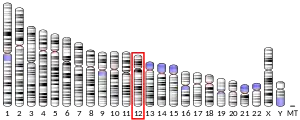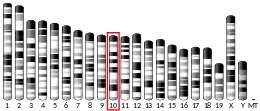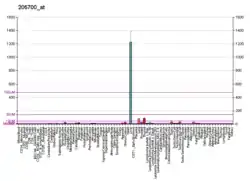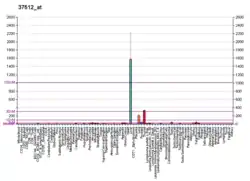HSD17B6
Hydroxysteroid 17-beta dehydrogenase 6 is an enzyme that in humans is encoded by the HSD17B6 gene.[5][6][7]
| HSD17B6 | |||||||||||||||||||||||||||||||||||||||||||||||||||
|---|---|---|---|---|---|---|---|---|---|---|---|---|---|---|---|---|---|---|---|---|---|---|---|---|---|---|---|---|---|---|---|---|---|---|---|---|---|---|---|---|---|---|---|---|---|---|---|---|---|---|---|
| Identifiers | |||||||||||||||||||||||||||||||||||||||||||||||||||
| Aliases | HSD17B6, HSE, RODH, SDR9C6, hydroxysteroid (17-beta) dehydrogenase 6, hydroxysteroid 17-beta dehydrogenase 6 | ||||||||||||||||||||||||||||||||||||||||||||||||||
| External IDs | OMIM: 606623 MGI: 1351670 HomoloGene: 20811 GeneCards: HSD17B6 | ||||||||||||||||||||||||||||||||||||||||||||||||||
| |||||||||||||||||||||||||||||||||||||||||||||||||||
| |||||||||||||||||||||||||||||||||||||||||||||||||||
| |||||||||||||||||||||||||||||||||||||||||||||||||||
| |||||||||||||||||||||||||||||||||||||||||||||||||||
| |||||||||||||||||||||||||||||||||||||||||||||||||||
| Wikidata | |||||||||||||||||||||||||||||||||||||||||||||||||||
| |||||||||||||||||||||||||||||||||||||||||||||||||||
The protein encoded by this gene has both oxidoreductase and epimerase activities and is involved in androgen catabolism. The oxidoreductase activity can convert 3 alpha-adiol to dihydrotestosterone, while the epimerase activity can convert androsterone to epi-androsterone. Both reactions use NAD+ as the preferred cofactor. This gene is a member of the retinol dehydrogenase family. Transcript variants utilizing alternative polyadenylation signals exist.[7]
References
- GRCh38: Ensembl release 89: ENSG00000025423 - Ensembl, May 2017
- GRCm38: Ensembl release 89: ENSMUSG00000025396 - Ensembl, May 2017
- "Human PubMed Reference:". National Center for Biotechnology Information, U.S. National Library of Medicine.
- "Mouse PubMed Reference:". National Center for Biotechnology Information, U.S. National Library of Medicine.
- Baker ME (Feb 2001). "Evolution of 17beta-hydroxysteroid dehydrogenases and their role in androgen, estrogen and retinoid action". Mol Cell Endocrinol. 171 (1–2): 211–5. doi:10.1016/S0303-7207(00)00414-7. PMID 11165032. S2CID 42947381.
- Persson B, Kallberg Y, Bray JE, Bruford E, Dellaporta SL, Favia AD, Duarte RG, Jornvall H, Kavanagh KL, Kedishvili N, Kisiela M, Maser E, Mindnich R, Orchard S, Penning TM, Thornton JM, Adamski J, Oppermann U (Feb 2009). "The SDR (short-chain dehydrogenase/reductase and related enzymes) nomenclature initiative". Chem Biol Interact. 178 (1–3): 94–8. doi:10.1016/j.cbi.2008.10.040. PMC 2896744. PMID 19027726.
- "Entrez Gene: HSD17B6 hydroxysteroid (17-beta) dehydrogenase 6 homolog (mouse)".
Further reading
- Biswas MG, Russell DW (1997). "Expression cloning and characterization of oxidative 17beta- and 3alpha-hydroxysteroid dehydrogenases from rat and human prostate". J. Biol. Chem. 272 (25): 15959–66. doi:10.1074/jbc.272.25.15959. PMID 9188497.
- Huang XF, Luu-The V (2000). "Molecular characterization of a first human 3(alpha-->beta)-hydroxysteroid epimerase". J. Biol. Chem. 275 (38): 29452–7. doi:10.1074/jbc.M000562200. PMID 10896656.
- Kedishvili NY, Belyaeva OV, Gough WH (2001). "Cloning of the human RoDH-related short chain dehydrogenase gene and analysis of its structure". Chem. Biol. Interact. 130–132 (1–3): 457–67. doi:10.1016/S0009-2797(00)00291-X. PMID 11306067.
- Chetyrkin SV, Hu J, Gough WH, et al. (2001). "Further characterization of human microsomal 3alpha-hydroxysteroid dehydrogenase". Arch. Biochem. Biophys. 386 (1): 1–10. doi:10.1006/abbi.2000.2203. PMID 11360992.
- Huang XF, Luu-The V (2001). "Gene structure, chromosomal localization and analysis of 3-ketosteroid reductase activity of the human 3(alpha-->beta)-hydroxysteroid epimerase". Biochim. Biophys. Acta. 1520 (2): 124–30. doi:10.1016/s0167-4781(01)00247-0. PMID 11513953.
- Strausberg RL, Feingold EA, Grouse LH, et al. (2003). "Generation and initial analysis of more than 15,000 full-length human and mouse cDNA sequences". Proc. Natl. Acad. Sci. U.S.A. 99 (26): 16899–903. Bibcode:2002PNAS...9916899M. doi:10.1073/pnas.242603899. PMC 139241. PMID 12477932.
- Jones MR, Italiano L, Wilson SG, et al. (2006). "Polymorphism in HSD17B6 is associated with key features of polycystic ovary syndrome". Fertil. Steril. 86 (5): 1438–46. doi:10.1016/j.fertnstert.2006.04.027. PMID 17070195.
- Belyaeva OV, Chetyrkin SV, Clark AL, et al. (2007). "Role of microsomal retinol/sterol dehydrogenase-like short-chain dehydrogenases/reductases in the oxidation and epimerization of 3alpha-hydroxysteroids in human tissues". Endocrinology. 148 (5): 2148–56. doi:10.1210/en.2006-1491. PMC 2571913. PMID 17289849.
This article is issued from Wikipedia. The text is licensed under Creative Commons - Attribution - Sharealike. Additional terms may apply for the media files.





